(The Buddhabhasita Dasabhadra Karmamarga
Sutra)
Thus
have I heard. At one time, Lord Buddha was staying in the palace of the Dragon
king of the Ocean together with 8,000 Mahabhiskus and 32,000 Bodhisattvas and Mahasattvas. On that occasion, Lord Buddha addressed the
king of dragons as follows :
“Different ways of thinking lead sentient
beings to different kinds of action which in turn subject them to rebirth in
different courses of existence (ie. As devas, human beings, assures,
inhabitants of the Hades, hungry devils, or animals). Now, dragon king, do you notice the variety
of forms, colours, and species in this congregation and in the sea ? Are they
not different from one another ?”
“Now, all these variations are due to the
mind which is responsible for our bodily, oral, and mental acts of either
wholesome or unwholesome nature. As to
the mind itself, it is formless, ungraspable and unperceivable. It is nothing but a collection of phenomena,
transient and delusive by nature.
Categorically, things have no absolute existence of their own and there
is neither a ‘self’ nor concomitance of a ‘self’. In accordance with their karma (deeds),
things appear in various forms ; but positively, there is no creator at the
back of them. Hence all dharmas (things
or phenomena) are above speech and concept, and their very own nature is
phantom-like. Realising this, the wise
perform, as they ought to, wholesome deeds; and by doing so, they attain in
their birth skhandhas (aggregates), ayatanas (sphere of meeting or basis of
consciousness), and dhatus (elements) of noble nature, and they are pleasing to
the eye of those who look at them.”
“Now, Dragon King, when you look at the
body of a Buddha begotten by hundred thousand kotis of meritorious and virtuous
deeds, you notice that every part of it is magnificient form. Its splendour
outshines that of the assembly ; and even if myriad kotis of Isvaras (gods)
were present, the light (from their bodies) would be overshadowed. Verily, those who gaze at the body of a
Tathagata will find themselves dazzled.
“Again, please look at the Mahasattvas
present here. How elegant and pure are
their magnificent forms ! This is due
solely to the performance of good deeds. Again, look at the 8 species of devas,
dragons, etc. All of them are powerful
and influential beings, and their favorite birth is also due to the merit of
their good deeds.”
“Now, in this big ocean we find all sentient
beings therein, large or small in size, have coarse and ugly bodies. This is due to the fact that they once
performed unwholesome bodily, verbal and mental acts out of all kinds of
thoughts from their own minds ; and accordingly each of them now reaps the
retribution of his own acts.”
“Dragon king, you should understand thoroughly
the law of cause and effect and as a rule of practice good deeds. Make this your constant study and practice
and make all sentient beings to do likewise.
You must have unshakable right view and must not fall back to the heresies
of eternalism and annihilationism.
Towards the Sangha (lit. the fields of merit), respect and make
offerings to them, and rejoice at their holiness. For doing so, you will
likewise be respected and supported by men and devas who make offering to you.”
“Dragon king, we should know this. There is
one way for the Bodhisattva to annihilate all sufferings of evil
existence. What is this one way ? It is
constantly, day and night, to remember and contemplate on meritorious dharmas
so that their impression becomes stronger and stronger in the mind and not the
least evil thought can have a chance to mingle therein. Such a practice will enable one to free
oneself from evil deeds, to complete the work of wholesome dharmas and to have
frequent opportunity to be in the presence of Buddhas, Bodhisattvas and other
holy persons (for their teaching).”
“Now, why they are called wholesome dharmas
? Because they are fundamental religious
duties, by practicing which all men, devas, Arhats, Pratyeka Buddhas, and
Supremely Enlightened Buddhas attain their respective fruits. Therefore they are called wholesome
dharmas. These wholesome dharmas are the
10 wholesome deeds. What are they ? They
are : abstinence forever from killing, stealing, unchaste conduct, lying, slandering,
harsh language, frivolous talks, lust or covetousness, anger, and heretical
views.”
“Dragon king, he who abstains from killing
will attain 10 means in warding off evil passions (Klesas). What are they ? They are : (1) he gives to
all sentient beings alike without fear (ie. Without caring his own welfare and
would sacrifice even his own limbs, (angaparicago), (2) great in his compassion
towards all sentient beings, (3) he gives up forever wrathful passions and
such-like habbits, (4) he is always free from illness, (5) he life is long, (6)
he is constantly protected by non-human beings, (7) he is never troubled by
nightmare, he sleeps and wakes happily (8) The entanglement of enmity is cut
off and all hatreds against him vanish themselves, (9) he is free from the care
of being born in an evil existence, (10) when he dies, he will go to the deva
world. Should this man turn his good
merits (punyaparinamana) towards the cause of supreme perfect enlightenment (Anutara Samyak Sambodhi), he will attain in
his future Buddhahood the Buddha attribute which enables him to determine the
span of his life by free will.”
“Dragon king, let us now turn to the next
item. He who abstains from stealing will
gain ten advantages which will preserve his faith in the Dharma. What are these
ten ? They are : (1) he amasses a great fortune which cannot be scattered away
neither by the government, nor by robbers, nor by spendthrift sons, (2) he is
thought well of by a great number of people, (3) no one bullies him or does him
an injustice, (4) he is praised everywhere (lit. in ten quarters), (5) he is
free from the care of being injured maliciously (by others), (6) his good name
spreads, (7) he has no fear in the public, (8) he lacks not of wealth,
longevity, health, comfort, and oratory, (9) he is always in a charitable mood,
(10) he will go to the deva world upon his death. Should he turn his good merits towards the
cause of Anutara Samyak Sambodhi, he will attain in his future Buddhahood the
great Bodhi Wisdom of Purity.”
“Dragon king, let us turn to the next. He who
abstains from unchaste conduct will attain 4 qualities, the possessing of which
is commended by the wise. What are they
? They are : (1) all his sense organs are in good condition, (2) he is always
away from tumult and excitement, (3) he is praised and adored by the whole
world, (4) his wife is incorruptible.
Should he turn his good merits towards the cause of Anutara Samyak
Sambodhi, he will gain in his future Buddhahood the Tathagata special physical
characteristic of concealment (of his private part like that of a horse).”
“Dragon king, let us turn to the next. He who
abstains from lying will attain 8 qualities, the possessing of which is
commended by the devas. What are they ?
(1) his mouth is always pure and
fragrant as the Utpala flower (Blue lotus), (2) he commands the confidence and
the obedience of all worlds, (3) what he says becomes proof and he himself is
held in esteem by devas and men, (4) he is in the habit of giving comforts to
all sentient beings by kind words, (5) he gets refined pleasure and his speech,
action, and thought are all pure, (6) he makes no blunder in speaking and his
mind is always joyful, (7) his words carry weight and are respected and obeyed
by devas and men, (8) his wisdom is extraordinary and inferior to none. Should he turn his good merits towards the
cause of Anutara Samyak Sambodhi, he will gain in his future Buddhahood the
Buddha attribute of truthful speech.
“Dragon king, let us turn to the next. If a man abstains from slandering, he will
attain 5 incorruptible qualities. What are they ? They are : (1) incorruptive
body, for no one can harm him, (2) incorruptive family, because no one can
break them up, (3) incorruptive confidence, because this is the natural consequence
of the very act (non-slandering) itself, (4) incorruptive spiritual work,
because it is done on a solid base, (5)
incorruptive learned friends or teachers, because he does not mislead
people. Should he turn his good merits towards the cause of Anutara Samyak
Sambodhi, he will be attended by a train of noble disciples in his future
Buddhahood and no devils (Maras
“Dragon king, let us turn to the next. If a man abstains from harsh language, he
will accomplish 8 pure deeds. What are
they ? They are : (1) his speech is free from error, (2) all that he says are
profitable, (3) his words agree with reasoning, (4) his speech is fine and
witty, (5) his speech is comprehensible, (6) his words are trustworthy, (7) his
words are above criticism, and (8) his words are pleasing and enjoyable. Should
he turn his good merits towards the cause of Anutara Samyak Sambodhi, he will
attain all the characteristics of the Brahma (pure) voice of a Tathagata in his
future Buddhahood.”
“Dragon king, let us turn to the next. If a man abstains from frivolous talks, he
will succeed in getting 3 kinds of certainty. What are they ? They are : (1) he
is bound to be beloved by the wise, (2)
he is certainly able to answer questions wisely and according to reality, (3)
His authority and virtue are certainly superior to those of devas and men and
he himself is free from falsehood.
Should he turn his good merits towards the cause of Anutara Samyak
Sambodhi, he will attain in his future Buddhahood the Buddha attribute of
prediction (ie. Foretelling that so and so will become a Buddha at such and
such a time), and all such predictions made are never given in vain.”
“Dragon king, let us turn to the next. If a man frees himself from covetousness, he
will gain 5 kinds of freedom. What are they ? They are : (1) freedom in bodily,
oral and mental acts, for his sense organs are all perfect, (2) freedom in
money and property matters, for neither his enemies nor thieves can rob him,
(3) freedom in felicitous enjoyment, for all that he wants to get he can always
have, (4) freedom like that enjoyed by the king, for people offer him (as they
do to their king) all kinds of valuables, rare and exquisite things, (5) what
he gets is hundred times better than what he expects, for in his previous lives
he was never mean or jealous. Should he
turn his good merits towards the cause of Anutara Samyak Sambodhi, in his
future Buddhahood he will be highly adored by the inhabitants of the 3 planes
(Kama, Rupa, and Arupa) and all of them will respectfully make offerings to
him.”
“Dragon king, let us turn to the next. If a man frees himself from anger, he will
get 8 kinds of joyful and pleasing mental states. What are they ? They are :
(1) his mind is free from desires to injure others, (2) his mind is free from
anger, (3) his mind is free from desires to argue, (4) his mind is affable and
straightforward, (5) his mind is as compassionate as the saints (Ariyans), (6)
his mind is always turned towards objects which will benefit, and give comfort
to, all sentient beings, (7) his body and physical feature are dignified and
elegant, commanding the respect of all, (8) he will soon be born in the Brahma
world on account of his kindness and tolerating spirit. Should he turn his good
merits towards the cause of Anutara Samyak Sambodhi, he will attain in his future Buddhahood the Buddha-mind which is
free from impediment (ie. Omniscient) and people will never be tired in looking
at him.”
“Dragon king, let us turn to the next. If a man frees himself from heretical views,
he will gain 10 kind of merits. What are
they ? They are : (1) he gets true happiness beneficial to his mind, he gets
genuinely good companion, (2) he has firm faith in the law of cause and effect
and abstains from doing evil even at the cost of his life, (3) he takes refuge
in the Buddha and not in devas or others, (4) his mind is affable and
straightforward and his views are right, and he is free forever from doubtful
speculations, good or evil, (5) he will never born in an evil existence, but
born either as a man or as a deva, (6) his blessing and wisdom are infinite and
they increase themselves at every turn, (7) he departs forever from the wrong
path and treads only the Noble (Ariyan) Way, (8) the heretical view that there
is a self within the body never arises in his mind and he gives up all evil
deeds, (9) the view he holds is free from errors, (10) calamities will not
befall him. Should he turn his good merits towards the cause of Anutara Samyak
Sambodhi, he will realize in his future
Buddhahood all the doctrines of the Buddha and attain supernormal powers which
will give him perfect freedom.”
“The
Buddha further spoke to the Dragon king on that occasion as follows :
“If a Bodhisattva, in carrying out these
meritorious deeds when treading the holy path , abstains from killing and at
the same time practices giving ; he will be always rich in wealth which no one
can rob him, will live long, will not die prematurely, and will not be injured
by enemies or robbers.”
“Because a Bodhisattva never takes anything
which is not given to him and at the same time he gives alms, he is always rich
in wealth which no one can rob him, he is incomparable, and he is able to
collect all Buddha-Dharmas (Tripitakas).”
“Because he abstains from impure acts and also
gives away charity, he is always rich in wealth which no one can rob him, the
members of his family are chaste and obedient and no one can stare at his
mother, wife and daughter with lustful desire.”
“Because he abstains from untrue words and
also gives alms, he is always rich in wealth which no one can rob him, the
members of his family are in good terms with one another, they enjoy the
pleasure of having common objects in view, and they never quarrel with one another.”
“Because he abstains from using harsh or
coarse word and at the same time practices the giving of alms, he is always
rich in wealth which no one can rob him, people gladly accept him as their
teacher in all preaching assemblies, and his words are accepted without
challenge.”
“Because he abstains from meaningless talks
and at the same time practices giving, he is rich in wealth which no one can
rob him, his words are never uttered in vain but accepted with due respect by
everyone, and he is skilful in using expedient means (Upaya) to clear up
doubtful points.”
“Because his mind is free from greediness and
at the same time he gives away alms, he is rich in wealth which no one an rob
him, he is ready to give all that he has to benefit others, he is firm in faith
and strong in intellect, and he has great energy and authority.”
“Because his mind if free from hatred and he
also practices alms-giving, he is rich in wealth which no one can rob him, he
can quickly attain by his own efforts a mind which is free from impediment, his
sense organs are fine and well-shaped, and he is pleasing to and respected by
those who see him.”
“Because his mind is free from heretical
views and at the same time he practices alms-giving, he is rich in wealth which
no one can rob him, he is always born in a family, the members of which hold
right views, respect the Dharma and have faith in them, he will see Buddha, he
hears the Dharma and makes offerings to the Sangha, and he never forgets or
loses the Bodhi mind (Bodhicitta).”
“Such are the great benefits accruing to a
great being (Mahasattva) who, in performing the 10 meritorious deeds during the
course of his Bodhisattva career, adorns
his good work by means of the merits of alms-giving.”
“Dragon king, I am going to summarise the
above. Who so practices the 10 meritorious deeds and adorns his good work by
observing the precepts (Silas) will get the meaning and benefit of the whole
system of the Dharma and his great vows will be fulfilled. Who so adorns (the practice of) the 10
meritorious deeds with the virtue of patience and tolerance (Ksanti) will get
the perfect voice of the Buddha (which is understandable to all beings), and
his physical parts will all be in good form.
Who so adorns the 10 meritorious deeds with zeal and earnestness will be
able to conquer devils (Maras
“Who so adorns the 10 meritorious deeds
with loving kindness will have no evil thoughts against others arising in
him. Who so adorns the 10 meritorious
deeds with compassion will have pity on all sentient beings and will never get
tired of them. Who so adorns the 10
meritorious deeds with sympathetic joy will never be jealous of others when
they practice virtue. Who so adorns the
10 meritorious deeds with equanimity will be free from likes and dislikes in
favourable and unfavourable circumstances respectively.”
“Who
so adorns the 10 meritorious deeds with the 4 ways of rendering assistance to
others (ie. Giving, loving speech, beneficial conduct and cooperation)
will be always zealous in uplifting and
teaching all sentient beings. Who so
adorns the 10 meritorious deeds with mindfulness will be skilful in the practice
of the contemplation of the 4 foundations of mindfulness (ie. Mindfulness to
joy, feeling, thought, and phenomena). Who so adorns the 10 meritorious deeds
with diligence will be able to give up forever all evil acts and to accomplish
all good deeds.
‘Who
so adorns the 10 meritorious deeds with supernatural power his body and mind
will always be in serenity and in a happy mood. Who so adorns the 10
meritorious deeds with the 5 spiritual faculties (faith, energy, mindfulness,
concentration, and insight) will be firm in faith, diligent, free from sloth,
never under delusion, calm and in fine spirit, and never contaminated by moral
defilement (Klesa). Who so adorns the 10
meritorious deeds with 5 powers (Powers to strengthen the 5 abovesaid spiritual
faculties), all hatreds against him vanish and no one can harm him. Who so adorns the 10 meritorious deeds with
the 7 factors of enlightenment (mindfulness, study of doctrines, energy, zest,
serenity, concentration, and equanimity) will be skilful in understanding the
nature of all phenomena.”
“Who so adorns the 10 meritorious deeds with
the 8-fold Noble Path (Right views, right thoughts, right speech, right
actions, right living, right exertion, right recollection, and right
meditation) will be able to free himself from all bondages (that tie him to the
world) and moral defilement. Who so adorns the 10 meritorious deeds with
insight will know the nature of all things as they really are. Who so adorns
the 10 meritorious deeds with expedient means to sentient beings to
enlightenment (Upaya) will gain quickly and completely the happiness of the
conditioned (Samkrta) and unconditioned (Asamkrta) Dharmas.”
“Dragon king, we should know that these 10
meritorious deeds will lead us to master completely the Dharmas including the
attainment of the 10 Balas (Forces belonging to a Buddha), the 4 Fearlessness
(Fearless because of Supreme Perfect Enlightenment, fearless for freeing from
all taints, fearless in preaching the factors that bind beings to birth and
death, and fearless in preaching the way leading to emancipation) and the 18
independent states that distinguish a Buddha from others (Avenika
Dharmas). Therefore all of you should
practice them diligently.”
“Dragon king, let me give an
illustration. As all towns, districts
and villages have their foundation on the ground, and as all herbs, grass,
flower, wood and forest are grown from the earth ; similarly, all men and devas
maintain their footing upon these 10 meritorious ways which form the principal
base of all merits and upon which, all fruits of Arhatship ; and Pratyekaship
are to be attained and the whole path of a Bodhisattva and the whole system of
the Buddha Dharma are to be accomplished.”
Lord
Buddha having thus spoken, Dragon king, all the Bhikshus, and the whole realm
of devas, men, asuras and others who were in the assembly received with great
joy his teaching and put it into practice.











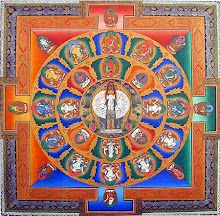




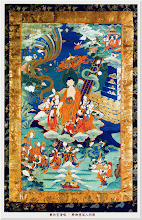

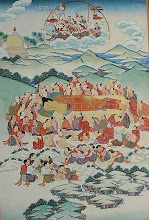


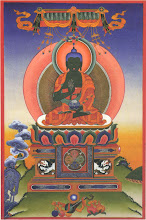




.jpg)

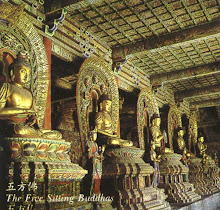













No comments:
Post a Comment